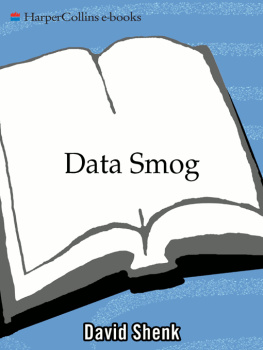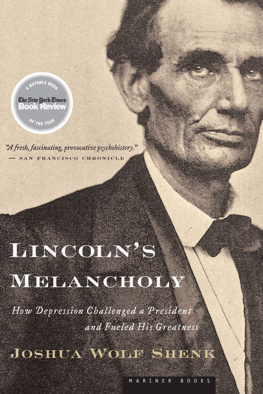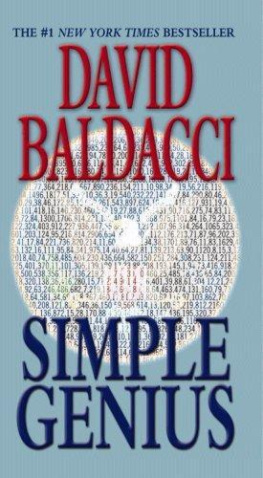David Shenk - The Genius in All of Us
Here you can read online David Shenk - The Genius in All of Us full text of the book (entire story) in english for free. Download pdf and epub, get meaning, cover and reviews about this ebook. year: 2010, publisher: Knopf Doubleday Publishing Group, genre: Art. Description of the work, (preface) as well as reviews are available. Best literature library LitArk.com created for fans of good reading and offers a wide selection of genres:
Romance novel
Science fiction
Adventure
Detective
Science
History
Home and family
Prose
Art
Politics
Computer
Non-fiction
Religion
Business
Children
Humor
Choose a favorite category and find really read worthwhile books. Enjoy immersion in the world of imagination, feel the emotions of the characters or learn something new for yourself, make an fascinating discovery.

- Book:The Genius in All of Us
- Author:
- Publisher:Knopf Doubleday Publishing Group
- Genre:
- Year:2010
- Rating:3 / 5
- Favourites:Add to favourites
- Your mark:
- 60
- 1
- 2
- 3
- 4
- 5
The Genius in All of Us: summary, description and annotation
We offer to read an annotation, description, summary or preface (depends on what the author of the book "The Genius in All of Us" wrote himself). If you haven't found the necessary information about the book — write in the comments, we will try to find it.
David Shenk: author's other books
Who wrote The Genius in All of Us? Find out the surname, the name of the author of the book and a list of all author's works by series.
The Genius in All of Us — read online for free the complete book (whole text) full work
Below is the text of the book, divided by pages. System saving the place of the last page read, allows you to conveniently read the book "The Genius in All of Us" online for free, without having to search again every time where you left off. Put a bookmark, and you can go to the page where you finished reading at any time.
Font size:
Interval:
Bookmark:
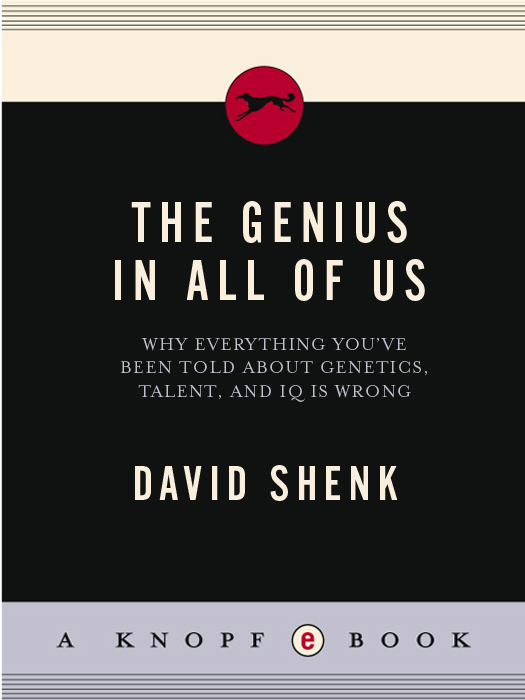
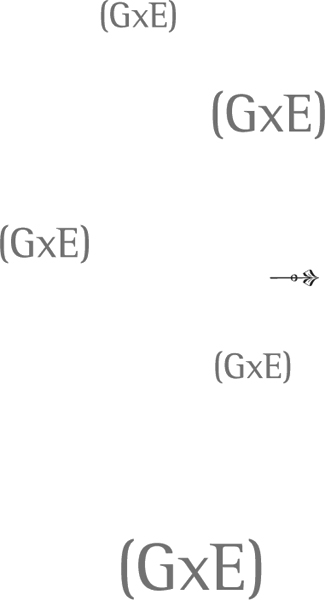
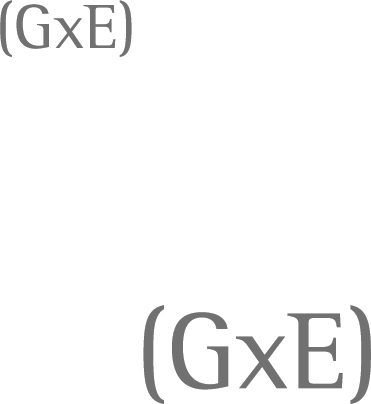
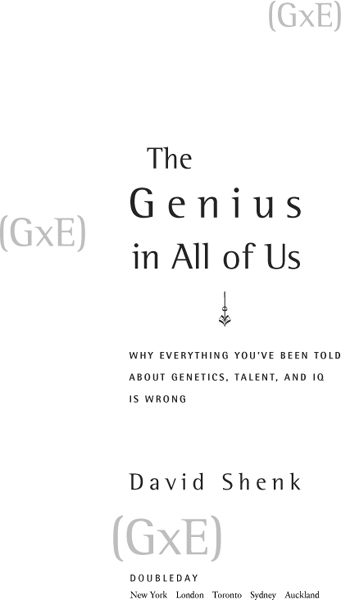
For my parents
Compared with what we ought to be, we are only half awake. Our fires are damped, our drafts are checked. We are making use of only a small part of our physical and mental resources Stating the thing broadly, the human individual lives far within his limits.
William James
Part One:
CHAPTER ONE
Contrary to what weve been taught, genes do not determine physical and character traits on their own. Rather, they interact with the environment in a dynamic, ongoing process that produces and continually refines an individual.
CHAPTER TWO
Intelligence is not an innate aptitude, hardwired at conception or in the womb, but a collection of developing skills driven by the interaction between genes and environment. No one is born with a predetermined amount of intelligence. Intelligence (and IQ scores) can be improved. Few adults come close to their true intellectual potential.
CHAPTER THREE
Like intelligence, talents are not innate gifts, but the result of a slow, invisible accretion of skills developed from the moment of conception. Everyone is born with differences, and some with unique advantages for certain tasks. But no one is genetically designed into greatness and few are biologically restricted from attaining it.
CHAPTER FOUR
Identical twins often do have striking similarities, but for reasons far beyond their genetic profiles. They can also have surprising (and often overlooked) differences. Twins are fascinating products of the interaction between genes and environment; this has been missed as heritability studies have been wildly misinterpreted. In reality, twin studies do not reveal any percentage of direct genetic influence and tell us absolutely nothing about individual potential.
CHAPTER FIVE
Child prodigies and superlative adult achievers are often not the same people. Understanding what makes remarkable abilities appear at different phases of a persons life provides an important insight into what talent really is.
CHAPTER SIX
Clusters of ethnic and geographical athletic success prompt suspicions of hidden genetic advantages. The real advantages are far more nuancedand less hidden.
Part Two:
CHAPTER SEVEN
The old nature/nurture paradigm suggests that control over our lives is divided between genes (nature) and our own decisions (nurture). In fact, we have far more control over our genesand far less control over our environmentthan we think.
CHAPTER EIGHT
Parenting does matter. There is much parents can do to encourage their kids to become achievers, and there are some important mistakes to avoid.
CHAPTER NINE
It must not be left to genes and parents to foster greatness; spurring individual achievement is also the duty of society. Every culture must strive to foster values that bring out the best in its people.
CHAPTER TEN
We have long understood that lifestyle cannot alter heredity. But it turns out that it can
Welcome to the ebook version of The Genius in All of Us, which offers a number of significant enhancements not available in the paper editions. Beyond the obvious advantages of portability and searchability, this ebook contains two nice features particularly suited to this book:
First, readers can link directly from endnote marks in the main text to the corresponding sources and notes in the Evidence sectionand then link directly to many of my original online sources. With about half of the books content residing in the notes section, this is a great opportunity to follow your curiosity as far as it will go.
Second, each chapter concludes with a direct link to an online discussion forum and to my ongoing blog on the subject. This book touches on a lot of powerful questions and concerns, and I hope readers will share their own thoughts and observations.
Of course, you can also simply ignore all these digital treats and read this ebook like an ordinary book-book. Perhaps after that you will sit down at an old oak table and hand-write me a letter on a nice thick piece of cotton-fiber vellum. Id love to read that letter too.
- D.S.
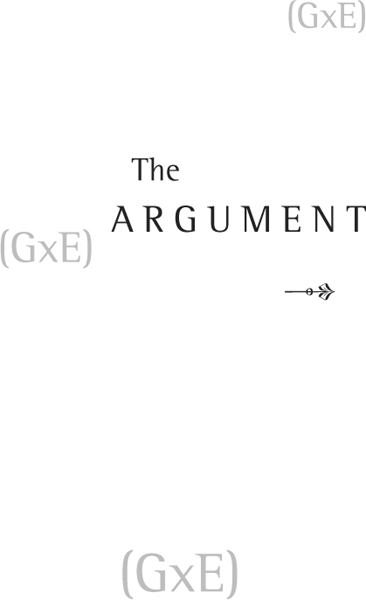
The Kid
B aseball legend Ted Williams was one in a million, widely considered the most gifted hitter of his time. in The New Yorker in 1960. It went over the first basemans head and rose meticulously along a straight line and was still rising when it cleared the fence. The trajectory seemed qualitatively different from anything anyone else might hit.
In the public imagination, Williams was almost a god among men, a superhuman endowed with a collection of innate physical gifts, including spectacular eye-hand coordination, exquisite muscular grace, and uncanny instincts..
But all that innate miracle-man stuffit was all , said Williams. He insisted his great achievements were simply the sum of what he had put into the game. Nothing except practice, practice, practice will bring out that ability, he explained. The reason I saw things was that I was so intense It was [super] discipline, not super eyesight.
Is that possible? Could a perfectly ordinary man actually train himself to be a dazzling phenomenon? We all recognize the virtues of practice and hard work, but truly, could any amount of effort transform the clunky motions of a whiffer or a chucker into the majestic swing of Tiger Woods or the gravity-defying leap of Michael Jordan? Could an ordinary brain ever expand enough to conjure the far-flung curiosities and visions of Einstein or Matisse? Is true greatness obtainable from everyday means and everyday genes?
Conventional wisdom says no, that some people are simply born with certain gifts while others are not; that talent and high intelligence are somewhat scarce gems, scattered throughout the human gene pool; that the best we can do is to locate and polish these gemsand accept the limitations built into the rest of us.
But someone forgot to tell Ted Williams that talent will out. As a boy, he wasnt interested in watching his natural abilities unfurl passively like a flower in the sunshine. He simply wantedneededto be the best hitter baseball had ever seen, and he pursued that goal with appropriate ferocity.. He always had that bat in his hand And when he made up his mind to do something, he was going to do it or know the reason why.
wasnt going to let anything stop me from being the hitter I hoped to be, Williams later recalled. Looking back it was pretty near storybook devotion.
In other words, he worked for it, fiercely, single-mindedly, far beyond the norm. He had one thought in mind and he always followed it, said his high school coach Wos Caldwell.
Greatness was not a thing to Ted Williams; it was a process.
This didnt stop after he got drafted into professional baseball. In Williamss first season with the minor league San Diego Padres, coach was always the first to show up for practice in the morning and the last to leave at night. And something more curious: after each game, Williams would ask the coach for the used game balls.
Font size:
Interval:
Bookmark:
Similar books «The Genius in All of Us»
Look at similar books to The Genius in All of Us. We have selected literature similar in name and meaning in the hope of providing readers with more options to find new, interesting, not yet read works.
Discussion, reviews of the book The Genius in All of Us and just readers' own opinions. Leave your comments, write what you think about the work, its meaning or the main characters. Specify what exactly you liked and what you didn't like, and why you think so.



